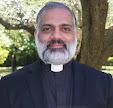Human Face of Petrine Ministry
Pope Benedict XVI on
Monday 11th February 2012 announced a decision of great importance
for the life of the Church. The Pope stated, “after having repeatedly examined my
conscience before God, I have come to the certainty that my strengths, due to
an advanced age, are no longer suited to an adequate exercise of the Petrine ministry. … For this reason, and well aware of the
seriousness of this act, with full freedom I declare that I renounce the
ministry of Bishop of Rome, Successor of Saint Peter, entrusted to me … on 19
April 2005, in such a way, that as from 28 February 2013, at 20:00 hours, the
See of Rome, the See of Saint Peter, will be vacant.”
It
is unheard that a Pope resigns. Is this act possible and canonical? The
Canon Law provides for the possibility of a Pope to renounce his office. In this
case, since there is no higher authority, his renunciation does not have to be
accepted by anyone but need only to be expressed freely.
Followed by the
Papal announcement, various theologians have expressed their viewpoints, both
positive as well as negative such as:
1. Pope Benedict XVI has truly been a Holy Father to the
family of God, the Catholic Church. His decision to resign is a beautiful
saintly act, Christ-like act of humility and love for the Church. This is the
act of one who thinks not about himself but only about the will of God and the
good of God’s people.
2. This act is
potentially great significance, and it may be that his resignation will be his
greatest contribution to ecclesiology. His frank admission about his strength
of mind and body needed for the Petrine ministry explains the humanness of the
pope and hence of the Church.
3. The papal decision is understood
to be a wonderful example of personal discernment. Not every man who is pope
will retire as Benedict XVI just did. It is part of God's plan for him. It is
discovered over time, in prayer and many times through the circumstances of
life.
4. The resignation is theologically founded, because it puts an
end not to the power of orders, but only to the power of jurisdiction.
5. The action takes on an impact “not simply innovative, but
revolutionary”.
6. Many have contrasted Benedict's
decision, with Blessed John Paul II's decision to soldier on to the end despite
the disease. Pope Benedict and Pope John Paul faced circumstances that were
alike in some ways. But these were two different men who heard God calling them
to act in two quite different ways.
7. From the historical point of view the resignation of the Pope
“appears to be in absolute discontinuity with the tradition and praxis of the
Church.” Resignation in the history is to be considered as exceptional cases.
8. It seems that Pope
Paul VI gave some thought to resigning, but he wouldn’t because “he cannot come
down from his cross.” Similar words were applied to Pope John Paul II as the
church watched him fade away: “You don’t come down from the cross.”
9. The cross is the status of every Christian and “rebelling
against one's status, rejecting a grace received, would appear to be for a
Christian a grave offense against the virtues.”
10. Resigning means losing the universal name of Peter and going
back to the private being of Simon.
11. Pope Benedict XVI should not resign, but should withdraw
such a supreme decision. Not the resignation, but its withdrawal becomes an act
of supernatural courage.
12. A martyr pope brings more souls to heaven than a hundred
resigned popes.
What will Benedict XVI be
remembered for in the long run? The tremendous emphasis he has placed on new
evangelization, his courageous stands against things like women's ordination
and same-sex marriage that set him firmly in opposition to, his equally
courageous defense of the Second Vatican Council as a council of both continuity
and reform, etc. He has written Jesus
of Nazareth, an important three-volume work on how to read the
Gospels. He has written encyclical letters on the virtues of love and hope and
important works on the Word of God and the Eucharist. He has delivered a series
of catechesis on the apostles and the teachings of St. Paul; on the Fathers and
doctors of the Church; on the theologians and religious founders and reformers
of the medieval Church; and on the teaching and witness of prayer found in the
Old and New Testaments. Above
all, it is also possible that he'll be best remembered as the pope who
resigned.
No doubt, Pope Benedict XVI is a great spiritual leader of our times. His
resignation is perceived as demonstration of his high spirituality, deep
humility, fine theology and great teaching. He will be remembered as one of the Church’s great teachers of the
faith. Pope Benedict is one of the wisest persons in our world today. Just
witnessing his ministry, reading his writings, is a beautiful lesson for all of
us in how to be a disciple of Jesus Christ. His clarity of thought on religious and
secular matters is appreciated by all. He was unafraid and courageous to speak
the truth in matters of faith and morals. He is very realistic to accept his
physical weakness due to insurmountable efforts throughout the past years in
various capacities. With his resignation he convincingly proclaims that the Church is Christ's. He considers his office of the Vicar of Christ is a
ministry in the Church entrusted to a humble and simple human being. The
ministry in the Church is important and it has to continue rather than the
person. Petrine ministry is to confirm the Church in
faith, and so, naturally, for continuing this ministry, another suitable person
will have to be elected.

No comments:
Post a Comment